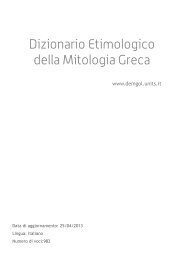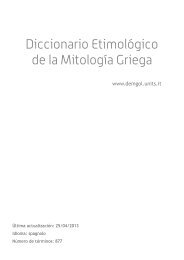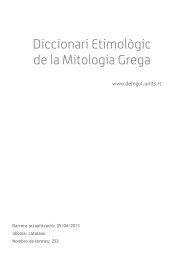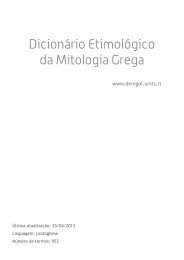Etymological Dictionary of Greek Mythology - Dizionario etimologico ...
Etymological Dictionary of Greek Mythology - Dizionario etimologico ...
Etymological Dictionary of Greek Mythology - Dizionario etimologico ...
Create successful ePaper yourself
Turn your PDF publications into a flip-book with our unique Google optimized e-Paper software.
Ἀκακαλλίς<br />
ACACALLIS<br />
<strong>Etymological</strong> <strong>Dictionary</strong> <strong>of</strong> <strong>Greek</strong> <strong>Mythology</strong> - www.demgol.units.it<br />
This was the name <strong>of</strong> one <strong>of</strong> the daughters <strong>of</strong> Minos, loved by Hermes and by Apollo, who was the mother <strong>of</strong> Miletus<br />
(Nicandr. ap. Anton. Lib. Met. 30.1), the young man with whom Minos fell madly in love. Others say that by Hermes<br />
she gave birth to Cydon (Pausan. 8, 53.4), or, by Apollo, to the Cretan twins Phylakidese and Philanderos, who were<br />
nursed by a she-goat (Pausan. 10, 16.5).<br />
The name refers to the tamarisk according to Dioscor. 1.89, or the narcissus, cf. Hesych. s. v., and is probably <strong>of</strong><br />
Egyptian origin (Chantraine, DELG).<br />
Theme: Transformation<br />
Ἀκαλανθίς<br />
ACALANTIS<br />
Daughter <strong>of</strong> King Pierus <strong>of</strong> Macedonia. With her eight sisters she dared compete with the Muses in song, and for this<br />
they were transformed into birds: Acalantis become a goldfinch (Anton. Lib. Met. 9).<br />
The name means precisely "goldfinch" (D'Arcy Thompson, A Glossary <strong>of</strong> <strong>Greek</strong> Birds, pp. 30 ss.) and derives from<br />
ἄκανθα, which refers to various spiny plants like the thistle, with metathesis from *ἀκανθαλίς.<br />
Category: Kinds <strong>of</strong> animals<br />
Theme: Transformation<br />
Ἄκαστος<br />
ACASTUS<br />
Son <strong>of</strong> the king <strong>of</strong> Iolchus, Pelias, and <strong>of</strong> Anaxibia, participated in the expedition <strong>of</strong> the Argonauts and in the hunt for<br />
the boar <strong>of</strong> Calydon (Apollod. Bibl. 1.9.10; 9.16; 9.27; 3.13.3; 13.7-8).<br />
It could be a compound <strong>of</strong> the verb κέκασμαι, "to excel, shine" and <strong>of</strong> ἀ- privative; it would therefore mean "he<br />
who does not shine"; rightly, Carnoy (DEMGR) points out that such a name would not be very fitting for a hero, for<br />
which reason it is better to take the ἀ- as an intensifier, and to understand the name as "he who shines much", "the<br />
splendid" (cf. anche von Kamptz, Homerische Personennamen, p. 151 and Scholz, in Snell, Lex. fr. Ep., col. 406). The<br />
feminine form Acasta (Ἀκάστη) is also attested, the name <strong>of</strong> an Oceanid (Hes. Theog. 356).<br />
Ἀχάτης<br />
ACHATES<br />
The name <strong>of</strong> a Trojan who accompanied Aeneas to Italy (Verg. Aen. 1.120); and <strong>of</strong> a Tyrrhenian companion <strong>of</strong> Dionysus<br />
(Nonn. Dion. 13, 309; 37, 350).<br />
3







